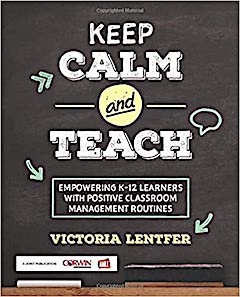How To Avoid Taking Things Personally
 By Victoria Lentfer
By Victoria Lentfer
If you have ever worked with new teachers, I am sure you have comforted them with “you can’t take what students do personally.” Unfortunately, telling someone to not take things personally doesn’t really teach them how.
If you ARE a new teacher – or find yourself (as I do) mentoring preservice or novice educators in these extremely stressful times – here are some thoughts that may help us all “keep calm and teach.”
We engage in conversations every day. Some are uplifting and some can be confrontational. Well-intentioned mentors and friends will reassure us with that easy sounding advice of not taking things personally, but how in the world do we do that?
Be Wary of the Story in Your Head
We can tell ourselves grand stories when our ego takes a hit due to a negative interaction with a colleague or authority figure. Unfortunately, our story does not always match reality.
We worry too much about what others may think about us. Most of the time people are rarely thinking about you; they are thinking about themselves. So be careful in giving too much energy to listening to the story in your head that is creating more inner drama than necessary.
You Are Worthy
Yes, you really are worthy. You belong. You matter. Repeat this for thirty minutes a day and you will begin to notice your actions and emotions will follow your words. Take time to take care of your self-esteem.
Engage in healthy activities. Be aware of the conversations you are having – are they uplifting or filled with disparaging comments? Go outside and relax into nature. Fresh air and exercise are great ways to get your mind off of work and stress.
What Story Are You Telling Yourself?
Be aware of your emotions. When you have a negative interaction with a student, colleague or friend, take inventory as to what emotions you are feeling – sad, anxious, worried, angry. Focus on you and not the other person. You can only control you and your emotions.
You have two choices of how you want to feel – do you want to feel good or do you want to feel bad? If you decide you want to feel good, try focusing on the positive aspects of the negative person or situation.
Start with general statements (“she can be helpful”) and gradually find more specific characteristics (“he helped with that problem last week”). Make a list of the positives. If you choose to feel bad, continue to complain and dwell in self-destructive thoughts. Again, we all have choices and can only control ourselves. Choose wisely.
Let It Go
When you are feeling attacked, it is rarely about you. It is often about the person slinging the mud. People often project their need to control you and the situation based on feelings of lack.
Prepare yourself for future interactions by concentrating on developing a soothing response for those times when someone triggers a sensitive emotion. Try silently repeating to yourself – everything is working out perfectly, or I know everything is going to be okay. This will help soothe your anxious mind and offer you an improved perspective.
Do Not Match Their Misery
Try not to sink to their negative energy level. Being aware of how you are feeling is a big indicator of how you are going to handle a difficult situation. Try not to respond or engage in a battle of words; this will lower your energy level. Also, be aware of your energy level prior to the interaction.
Begin each day with a mantra – today is going to be a great day! Having a high level of positive energy is an intentional practice. Throughout the day note things you appreciate. When you are in a state of appreciation, it is difficult to drop to someone else’s level of misery.
Be Kind to Yourself
The art of not taking things personally is to take feedback seriously, but not to a point of diminishing your value. Treat yourself gently. Take time to appreciate and love what you have to offer people. When you are kind to yourself, it is much easier to be kind to others. All of these strategies will work if you take the time to take care of yourself.
Practicing self-care will help to build your confidence and develop a stronger sense of your own worth. When you feel better about yourself, you are able to withstand difficult interactions.
These strategies I’ve shared will take time and intentional focus. Over time, you will begin to see the results, and you will not focus so much on what other people may or may not think about you. You will be too busy enjoying being you!




































This is a WONDERFUL post! I shared it with all of my networks. Thank you for the reminders. I always like to say, “There is no room for ego in teaching and learning.” But honestly, this year is the toughest in my 25 year career and the decisions I have to make as a principal are really daunting. This post helped me recenter. THANK YOU!
I heard something years ago from a TV show, can not remember which one. Someone had yelled at the character. Another person pulled the one yelled at aside and said, “You don’t know what is going on with that person. They might have just gotten bad news or something else that is wrong. Just think every time that you don’t know what that person is going through and feel empathy for them. I have used that myself when I can remember as my emotions boil.
I strongly agree with this idea. It has been a very difficult year for me because I am new in the system, but I am enjoying the challenge because it has strengthened me.